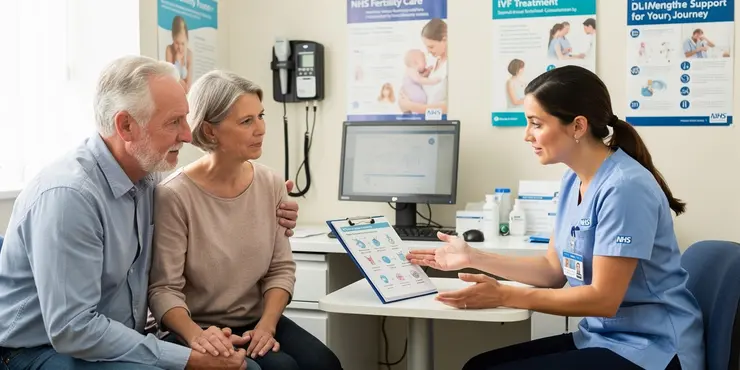
Find Help
More Items From Ergsy search
-

Is IVF successful?
Relevance: 100%
-

What is IVF?
Relevance: 100%
-

Are there risks associated with IVF?
Relevance: 95%
-

Who might need IVF?
Relevance: 93%
-
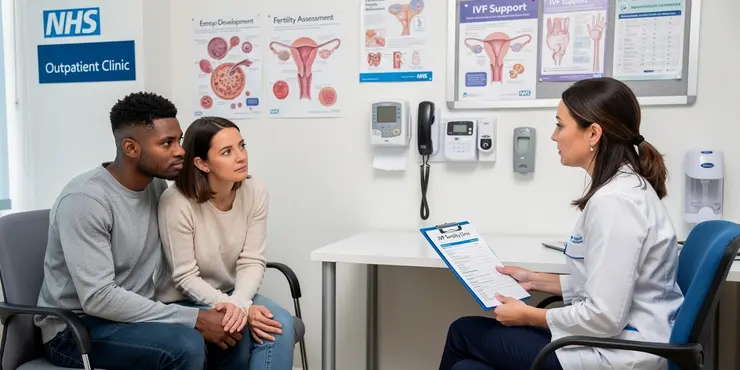
Does IVF guarantee pregnancy?
Relevance: 92%
-
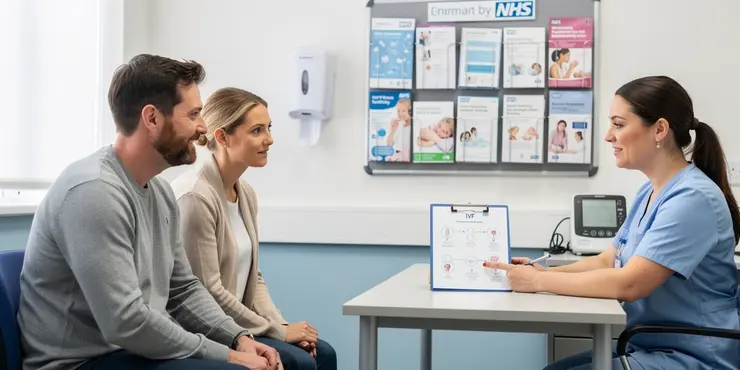
How does IVF work?
Relevance: 91%
-
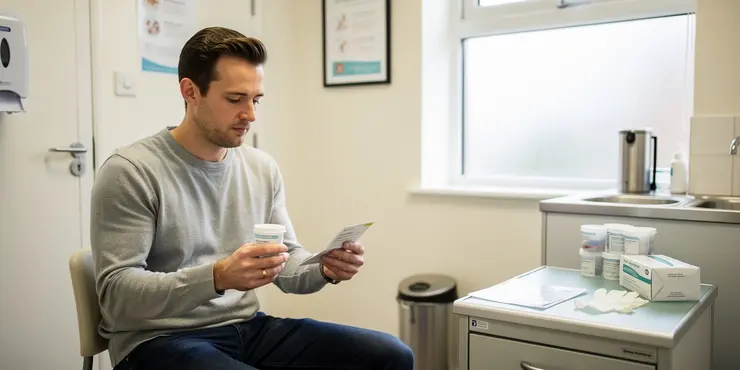
How is the sperm used in IVF?
Relevance: 90%
-
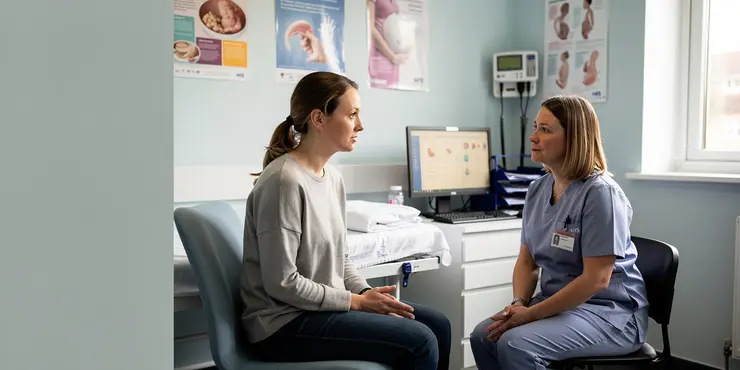
IVF Fertility Treatment from MumsNet
Relevance: 90%
-
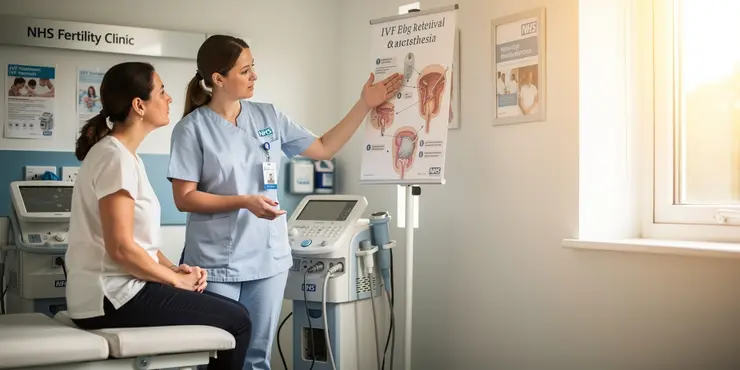
Does IVF require anesthesia?
Relevance: 90%
-
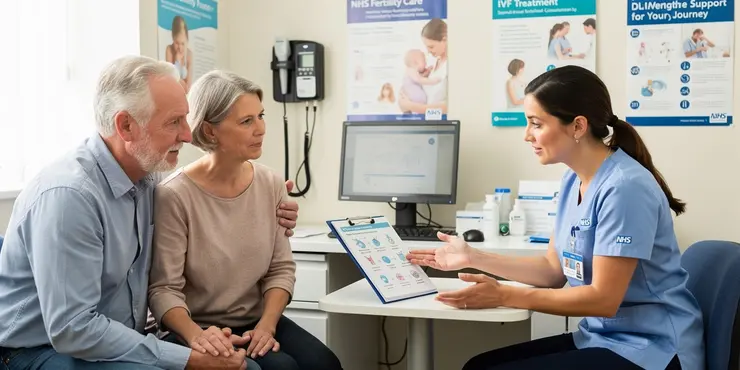
What is IVF and how does it work?
Relevance: 88%
-

Infertility - IVF Treatment and Patient Information
Relevance: 87%
-
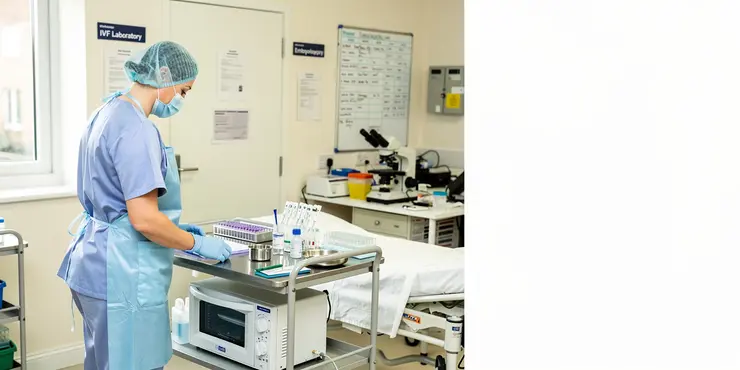
What is the role of the embryologist in IVF?
Relevance: 87%
-

Can IVF be used for gender selection?
Relevance: 86%
-

How do clinics determine if IVF is the right option?
Relevance: 86%
-

What are the main steps in an IVF cycle?
Relevance: 85%
-
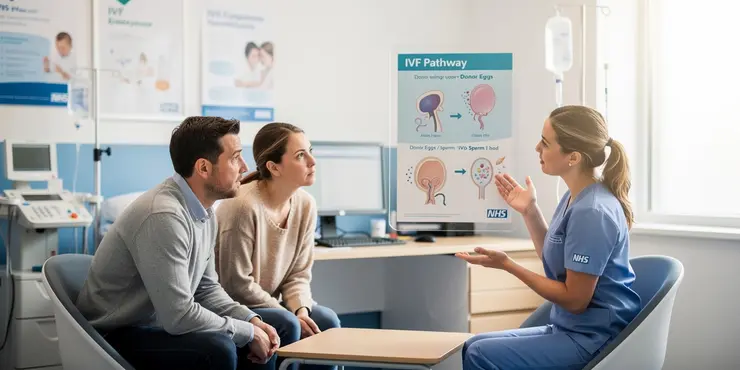
Can IVF be done with donor eggs or sperm?
Relevance: 84%
-

What should I expect during IVF treatment?
Relevance: 84%
-
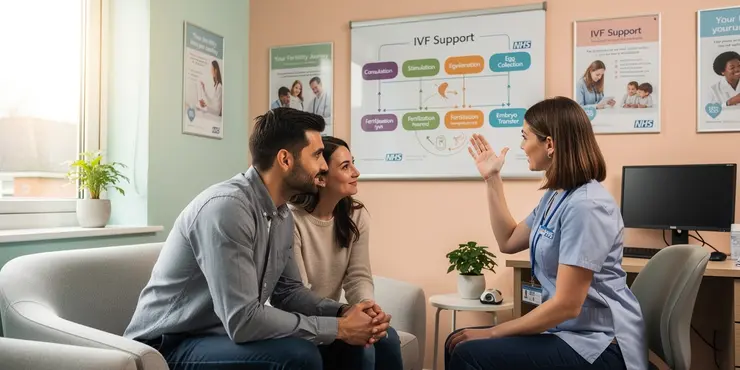
How long does an IVF cycle take?
Relevance: 83%
-

How many embryos are usually transferred in IVF?
Relevance: 82%
-

How are embryos transferred during IVF?
Relevance: 79%
-
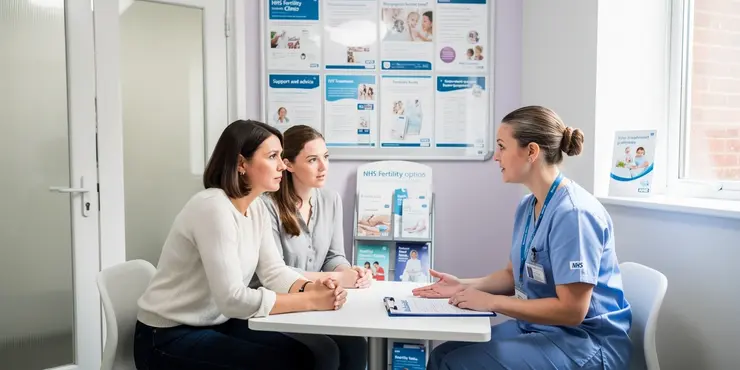
Fertility treatments on the up, but not via the NHS
Relevance: 39%
-

Female infertility explained
Relevance: 33%
-

How to apply for NHS funding to treat infertility
Relevance: 29%
-

What happens to unused embryos?
Relevance: 22%
-
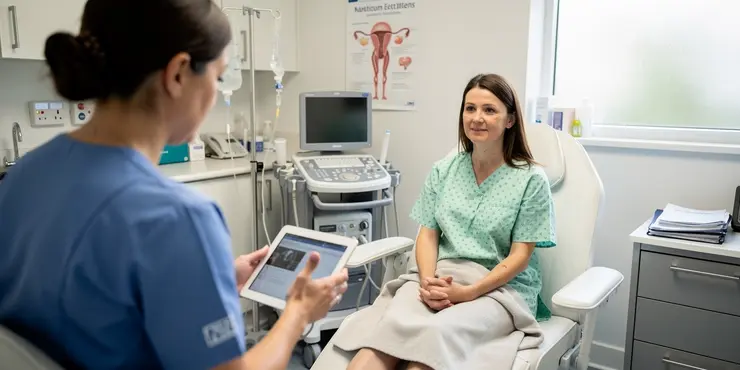
What is egg retrieval?
Relevance: 20%
-

Is it safe for a partner of someone with HIV to have children?
Relevance: 13%
-

Can medications affect pregnancy test results?
Relevance: 13%
-

What are the reasons for female infertility?
Relevance: 13%
-
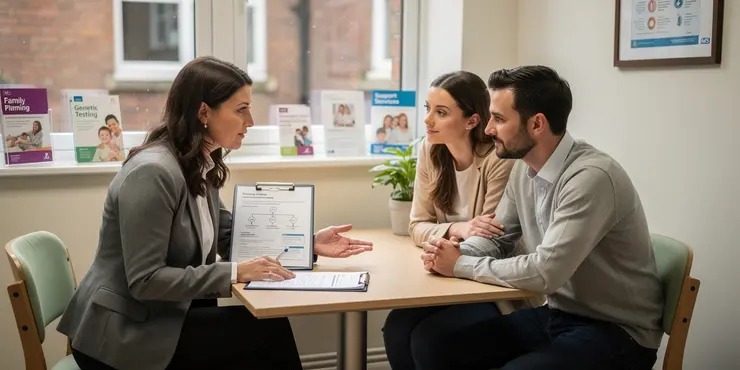
Can Huntington's disease be prevented?
Relevance: 13%
-
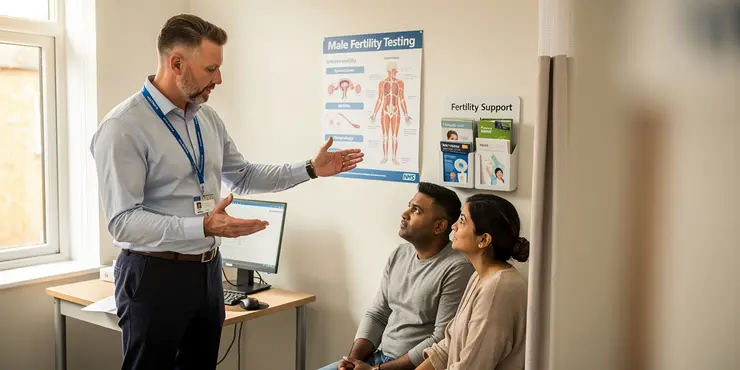
Ian Stones - Test him - Male Infertility
Relevance: 9%
-
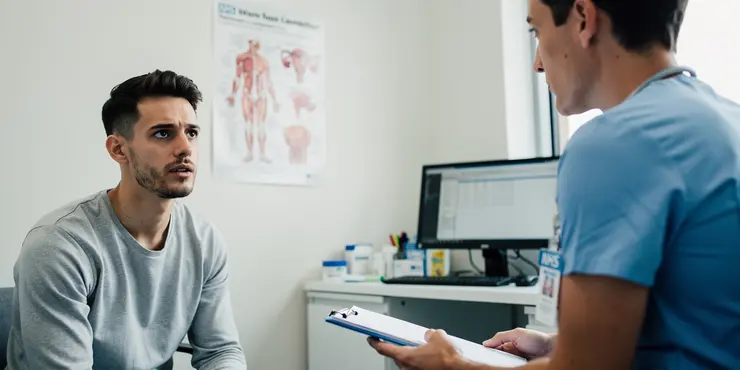
Is fertility affected by testicular cancer?
Relevance: 7%
What is IVF?
In vitro fertilisation (IVF) is a complex series of procedures used to help with fertility, prevent genetic problems, and assist with the conception of a child. It is one of the more widely known types of assisted reproductive technology (ART). The process involves retrieving eggs from a woman's ovaries, fertilising them with sperm in a laboratory, and then implanting the fertilised egg (embryo) into the woman's uterus.
How Does IVF Work?
The IVF process starts with ovarian stimulation. A woman takes hormonal medications to stimulate her ovaries to produce multiple eggs. Generally, a woman produces one egg per menstrual cycle, but IVF aims to produce multiple eggs to increase the chances of successful fertilisation.
After stimulation, egg retrieval takes place. The eggs are collected from the ovaries using a needle that is inserted through the vaginal wall under ultrasound guidance. This procedure is typically done under sedation or light anaesthesia to minimise discomfort.
Once the eggs are retrieved, they are taken to the laboratory, where they are mixed with sperm from a partner or a donor. This is the fertilisation step. In some cases, where male infertility is an issue, a single sperm may be injected directly into an egg, a process known as intracytoplasmic sperm injection (ICSI).
After fertilisation, the fertilised eggs are monitored in the laboratory to ensure that they begin growing. Within a few days, the eggs develop into embryos. The healthiest embryo or embryos are selected for transfer into the uterus. The embryo transfer is a straightforward procedure, often requiring no anaesthesia, where a catheter is used to place the embryo into the woman’s uterus.
If the embryo successfully implants into the lining of the uterus, pregnancy occurs. A blood test is usually carried out after about two weeks to check for pregnancy.
Considerations and Success Rates
IVF can be a costly and emotionally challenging process, and its success rates vary depending on various factors including age, the underlying cause of infertility, and lifestyle factors. According to the NHS, the chance of a successful pregnancy decreases as a woman gets older. Women under 35 have the highest success rates, while success rates drop significantly for women over 40.
In the UK, IVF may be available on the NHS, but eligibility can vary depending on criteria such as age, weight, and whether either partner has had children previously. Alternatively, IVF is available privately, although costs can be significant.
As with most medical procedures, there are potential risks and side effects involved with IVF, including multiple pregnancies, ovarian hyperstimulation syndrome (OHSS), and increased stress.
What is IVF?
IVF means In Vitro Fertilisation. It is a way to help people have babies. It can also help stop genetic problems. IVF is part of a group of treatments called assisted reproductive technology (ART). In IVF, doctors take eggs from a woman's body. Then, they mix the eggs with sperm in a lab. After that, the fertilised egg, called an embryo, is put back in the woman's body.
How Does IVF Work?
IVF starts with making the ovaries produce more eggs. A woman takes special medicines to make her produce more eggs than usual. Normally, a woman makes one egg each month. But, IVF tries to make more eggs to have a better chance of making a baby.
Next, doctors take the eggs from the ovaries. They use a needle to do this. The needle goes through the wall of the vagina. An ultrasound helps the doctor see what they are doing. This part is usually done with medicine to make the woman feel relaxed and comfortable.
Once the eggs are taken, they go to the lab. In the lab, the eggs are mixed with sperm from a man, who can be the woman's partner or a donor. This is called fertilisation. Sometimes, when there are sperm problems, doctors use one sperm and put it directly into an egg. This is called intracytoplasmic sperm injection (ICSI).
After fertilisation, doctors watch the eggs. They want to see them start to grow. After a few days, the eggs become embryos. The best embryo or embryos are chosen to be put back into the woman's body. Putting the embryo inside is simple. Doctors use a thin tube called a catheter. This part does not need any medicine for pain.
For a pregnancy to happen, the embryo has to stick to the woman's womb. A blood test is done after about two weeks to see if the woman is pregnant.
Considerations and Success Rates
IVF can be very expensive and can make people feel many emotions. How well it works can depend on things like the woman’s age, the reason for fertility problems, and lifestyle choices. The NHS says younger women have a better chance. Women under 35 are more likely to get pregnant with IVF. The chance is much lower for women over 40.
In the UK, some people can get IVF through the NHS, but it depends on things like age, weight, and if they already have children. There is also private IVF, but it can cost a lot.
Like all medical procedures, IVF has some risks. These include having twins or more babies at once, a condition called ovarian hyperstimulation syndrome (OHSS), and feeling more stressed.
Frequently Asked Questions
What is IVF?
IVF, or In Vitro Fertilization, is a process of assisted reproduction where an egg and sperm are combined outside the body to create an embryo.
How does IVF work?
IVF involves stimulating a woman's ovaries to produce multiple eggs, retrieving the eggs, fertilizing them with sperm in a laboratory, and then transferring the resulting embryo(s) to the woman's uterus.
Who might need IVF?
IVF may be recommended for couples with infertility issues such as blocked fallopian tubes, male infertility, unexplained infertility, or when other treatments have not been successful.
What are the main steps in an IVF cycle?
The main steps include ovarian stimulation, egg retrieval, fertilization, embryo culture, and embryo transfer.
How long does an IVF cycle take?
An IVF cycle typically takes about 4 to 6 weeks from the start of ovarian stimulation to embryo transfer.
What medications are used during IVF?
Medications used in IVF may include fertility drugs to stimulate egg production, medications to prepare the uterus for implantation, and others to support early pregnancy.
Is IVF successful?
IVF success rates vary depending on factors like age and the cause of infertility, but many couples achieve successful pregnancies and births through IVF.
Are there risks associated with IVF?
Risks of IVF can include multiple births, ovarian hyperstimulation syndrome (OHSS), and procedural complications, but risks are generally low with current medical protocols.
Can IVF be used for gender selection?
Yes, preimplantation genetic testing (PGT) can be used to select the gender of embryos in some cases, though it's subject to legal restrictions in various jurisdictions.
What is egg retrieval?
Egg retrieval is a minor surgical procedure to collect eggs from a woman's ovaries using ultrasound guidance and a needle.
What happens to unused embryos?
Unused embryos can be frozen for future use, donated to research or another couple, or discarded, depending on the preferences of the couple.
Does IVF require anesthesia?
IVF may require anesthesia, particularly during the egg retrieval process, to ensure patient comfort.
How is the sperm used in IVF?
Sperm can be obtained through ejaculation or extracted surgically and is then used to fertilize the egg in a laboratory setting.
What is the role of the embryologist in IVF?
The embryologist is responsible for handling eggs and sperm, facilitating fertilization, monitoring embryo development, and preparing embryos for transfer.
How are embryos transferred during IVF?
Embryos are transferred into the woman's uterus using a thin catheter, in a procedure that is typically quick and painless.
Can IVF be done with donor eggs or sperm?
Yes, IVF can involve donor eggs, sperm, or embryos if necessary, depending on the fertility issues of the couple.
Does IVF guarantee pregnancy?
IVF does not guarantee pregnancy, but it significantly increases the chances of conception for many couples facing infertility challenges.
How many embryos are usually transferred in IVF?
The number of embryos transferred depends on factors like the woman's age and the quality of the embryos, but usually one or two are transferred to reduce the risk of multiples.
What should I expect during IVF treatment?
Patients should expect multiple doctor visits for monitoring, medication injections, and, eventually, the procedures for egg retrieval and embryo transfer.
How do clinics determine if IVF is the right option?
Fertility specialists assess medical history, conduct tests, and consider other factors before recommending IVF as the most suitable treatment.
What is IVF?
IVF means "in vitro fertilization." It helps some people have babies. Doctors take eggs from a woman's body. They mix them with a man's sperm in a lab to make an embryo. Then, they put the embryo back in the woman's body to grow into a baby.
If you have trouble reading, ask someone to read with you. You can also listen to the text using a screen reader.
IVF means making a baby with help from doctors. This happens by taking an egg from a woman and a sperm from a man. They are put together outside the body to make a tiny baby called an embryo.
How does IVF work?
IVF is a way to help people have babies. Here is how it works in simple steps:
- A doctor gives medicine to help a woman's body make eggs.
- The doctor takes the eggs out of the woman's body.
- The eggs are mixed with sperm from a man in a special dish.
- They wait to see if an egg and sperm join and make an embryo.
- The doctor puts the embryo back into the woman's body.
- If the embryo grows well, it can become a baby.
Tools that might help:
- Images: Seeing pictures of each step can help understand the process.
- Videos: Watching a simple video might make it clearer.
IVF helps a woman have a baby. Doctors give the woman medicine to make her grow more eggs in her body. Then, doctors take the eggs out. They mix the eggs with a man's sperm in a special lab. When the eggs and sperm join, it makes an embryo. Doctors put the embryo back into the woman’s tummy to help her get pregnant.
You can use picture stories or videos to help understand this process better. Apps with simple words and pictures can also be helpful.
Who might use IVF?
IVF is a way to help people have babies.
Some people may use IVF if:
- They try to have a baby for a long time but can't.
- They have problems with their body that make it hard to have a baby.
- They want to have a baby but need some help.
If you want to know more or get help, you can talk to a doctor. They can explain IVF and what to do. Talking to someone is a good way to understand better.
Doctors may suggest IVF if a couple is having trouble having a baby. This can happen if:
- The woman has blocked tubes that make it hard for the egg to meet the sperm.
- The man has problems that make it hard for his sperm to reach the egg.
- No one knows why the couple can't have a baby (unexplained reasons).
- Other ways to help the couple have a baby have not worked.
A supportive tool is to talk to a doctor or a nurse to find out more. They can explain what happens, step by step.
What are the main steps in an IVF cycle?
Here are the main steps in IVF:
- Medicine to Help Your Body: You take medicine to make more eggs.
- Check Your Eggs: The doctor checks your eggs to see if they are ready.
- Collect the Eggs: The doctor takes the eggs out of your body.
- Mix Eggs and Sperm: The doctor puts the eggs and sperm together so they can meet.
- Watch the Growth: The doctor watches the tiny baby start to grow.
- Put Baby in the Uterus: The doctor puts the tiny baby back into your body.
- Pregnancy Test: After some time, you take a test to see if you are pregnant.
If you need help, you can:
- Ask someone you trust to explain things.
- Use a calendar to keep track of steps.
- Ask your doctor any questions you have.
Here are the main steps:
1. **Ovarian Stimulation:** This is when medicine helps the body make more eggs.
2. **Egg Retrieval:** This is when the eggs are taken out of the body.
3. **Fertilization:** This is when the eggs and sperm are put together to make embryos.
4. **Embryo Culture:** This is when the embryos grow in a safe place.
5. **Embryo Transfer:** This is when the embryo is put into the body.
If reading is hard, you can ask someone to read it to you, use a computer reader, or join a support group to learn more.
How long does it take to do IVF?
IVF can take about 4 to 6 weeks.
It's like a special plan to help people have a baby. A doctor helps with medicine and special care during this time.
If you find reading hard, ask someone to read it with you. You can also use tools that read the text out loud.
An IVF cycle usually takes 4 to 6 weeks. It starts with helping the ovaries make eggs and ends with putting an embryo in the womb.
What medicines do doctors use for IVF?
Doctors use special medicines to help with IVF.
These medicines help your body make more eggs.
They also help the body get ready to have a baby.
Doctors will tell you which medicines are right for you.
If you have questions, you can:
- Ask your doctor or nurse.
- Use apps that help you understand medical words.
- Look for videos that explain IVF simply.
In IVF, doctors use medicines to help make babies. These medicines can do three things: help the body make eggs, get the mommy's belly ready for the baby, and help the baby grow early on.
Does IVF work?
IVF stands for In Vitro Fertilization. It is a way to help people have a baby.
Sometimes IVF works, and sometimes it does not. It depends on many things, like age and health.
If you want help understanding this, you can ask a doctor, use simple videos, or ask someone you trust to explain it.
IVF is a way to help people have babies. How well it works depends on things like how old you are and why it's hard to have a baby. But lots of people do have healthy babies with IVF.
Is IVF safe, or are there risks?
IVF can have some risks. These risks are having more than one baby, a condition called ovarian hyperstimulation syndrome (OHSS), and problems during the procedure. But don’t worry, these risks are usually low because doctors are very careful.
Can you choose a baby's gender with IVF?
IVF can sometimes help parents choose if they want a boy or a girl baby. It is important to talk to a doctor to learn more about this. There are rules about when this can be done.
Here are some ideas to help you understand better:
- Ask your doctor to explain things in simple words.
- Use pictures or videos to help you learn.
- Talk with someone you trust about your questions.
Yes, doctors can sometimes use a test called PGT to choose if a baby will be a boy or a girl before it is born. But, there are rules about this in different places.
What is egg retrieval?
Egg retrieval is a process where doctors take eggs out of a woman's ovaries. They do this to help make a baby.
Tools that can help understand this better:
- Pictures or videos showing how it works.
- Talking to a doctor or nurse.
Egg retrieval is a small surgery. Doctors take eggs from a woman's ovaries. They use a special camera and a needle to help them.
What happens to embryos that are not used?
Sometimes, people have extra embryos that they don't use. An embryo is a tiny beginning of a baby made in a lab. Here is what can happen to these extra embryos:
- They can be saved for later. People can use them in the future if they want.
- They can be given to scientists. Scientists use them for important research.
- They can be donated to other people who want to have a baby.
- They can be respectfully disposed of if not needed.
If you want to understand more, you can ask someone you trust to help explain. You can also use tools like easy-to-read websites or talking computers that read the words aloud.
Unused embryos can be saved by freezing them for later. They can also be given to help science, shared with another couple, or not used anymore. The couple decides what to do with them.
Do you need medicine to make you sleep for IVF?
When a person goes through IVF, they might need medicine to make them sleep. This helps them not feel any pain when the doctor takes their eggs.
How is the sperm used in IVF?
Sperm are tiny cells from a man. They help make a baby.
In IVF, doctors take sperm and an egg from a woman. They put them together in a lab.
The sperm joins with the egg to start making a baby.
If it works, doctors put the tiny baby into the woman's tummy to grow.
You can use apps or videos to learn more about IVF. They show pictures and talk about it simply.
Sperm can come out of a man's body in two ways. It can happen naturally, or doctors can get it with surgery. After that, the sperm is used to help make a baby in a lab.
What does an embryologist do in IVF?
An embryologist is a special scientist who helps with making babies in a lab. They play a big part in IVF, which is when doctors help people have a baby.
Here is what the embryologist does:
- Look after eggs and sperm: They take care of the eggs from the mummy and sperm from the daddy.
- Mix them together: They help the egg and sperm meet so they can make a baby.
- Watch the tiny baby: They check to see if the tiny baby is growing well.
- Choose the best tiny baby: They pick the tiny baby that looks the best and is the healthiest.
- Help put the tiny baby back: They help the doctor put the tiny baby into the mummy's tummy.
Here are some tools that might help:
- Pictures and videos: They show what happens in IVF and how the embryologist works.
- Talking tools: Like audiobooks that can read this information out loud.
- Helpers: People who can read this with you if you have questions.
The embryologist is a person who helps make babies. They work with eggs and sperm to help them come together. They watch the baby cells grow. They get the baby cells ready to put into the mom.
How do doctors put embryos in the body during IVF?
During IVF, doctors help the woman's egg and man's sperm make a baby in a lab. This baby is called an embryo.
Once the embryo is ready, the doctor puts it inside the woman's belly where babies grow. This is called the womb.
Doctors use a tiny, soft tube to place the embryo safely into the womb.
It does not hurt, and the woman can usually go home the same day.
It helps to stay calm. You can bring a friend or family member to support you.
Doctors put tiny babies, called embryos, into a woman's belly, where they can grow. They use a very small tube called a catheter. This doesn't take long and it doesn't hurt.
Can IVF use donated eggs or sperm?
Yes, IVF can use eggs or sperm that someone gives. This is called donation.
If you can't use your own eggs or sperm, a doctor can help you get some from a donor. The doctor will then use these for IVF to help make a baby.
It's important to talk to a doctor who can explain how this works. They can answer your questions and help you understand the steps.
Support tools like pictures or videos about IVF can help explain this process. You can also ask a helper to go with you when you talk to the doctor.
Yes, sometimes IVF uses eggs, sperm, or embryos from donors to help a couple have a baby. This happens if the couple has trouble with fertility.
Does IVF always make you pregnant?
IVF stands for In Vitro Fertilization. It helps some people have a baby.
But IVF does not always work. It does not always make you pregnant.
Here are some ways to help you understand:
- Ask your doctor lots of questions.
- Look at pictures and videos about IVF.
- Talk to someone who has tried IVF.
IVF helps people who have trouble having a baby. It does not always make pregnancy happen, but it makes it more likely.
How many embryos are usually put back in IVF?
When doctors help people have a baby with IVF, they often put back 1 or 2 embryos. This helps the baby grow safely. It also helps to stop too many babies being born at once. Doctors will talk with you about what is best for you.
Tools to help you: You can use pictures and videos to learn about IVF. Talk to a friend or family member who can help explain things. You can also ask your doctor to explain in a simple way.
How many embryos the doctor puts back depends on things like how old the woman is and how good the embryos are. Doctors usually put back one or two embryos. This is to make sure there are not too many babies at once.
What happens during IVF treatment?
IVF is a way to help people have a baby.
Here is what to expect:
- Do some tests: Doctors will do tests to see what your body needs.
- Take medicine: You get medicine to help your body make eggs.
- Get the eggs: Doctors take the eggs from your body.
- Mix eggs and sperm: Eggs meet sperm in a lab to create embryos.
- Wait and watch: Embryos grow for a few days in the lab.
- Put embryo in the body: Doctors put the embryo in the uterus.
Remember, you can talk to your doctor if you have questions.
Tools that can help:
- Ask someone to explain words you don't know.
- Write down questions you have for the doctor.
- Use pictures to help you understand the steps.
People will need to go to the doctor many times. The doctor will check how they are doing, give them medicine shots, and later, do the steps to take out the eggs and put the embryo in.
How do clinics decide if IVF is right for you?
Doctors look at your health to decide if IVF can help. Here are steps they might take:
- Health Check: The doctor checks your body and how it works.
- Medical History: You talk to the doctor about your health in the past.
- Tests: You might have tests to learn more about your body.
- Talk to Doctor: The doctor explains what they find and what IVF can do.
If you have questions, ask the doctor or write them down. A family member or friend can help you too.
Doctors who help people have babies look at your health history. They also do some tests. Then, they think about other things too before saying if IVF is the best way to help you have a baby.
Useful Links
This website offers general information and is not a substitute for professional advice.
Always seek guidance from qualified professionals.
If you have any medical concerns or need urgent help, contact a healthcare professional or emergency services immediately.
Some of this content was generated with AI assistance. We’ve done our best to keep it accurate, helpful, and human-friendly.
- Ergsy carfully checks the information in the videos we provide here.
- Videos shown by Youtube after a video has completed, have NOT been reviewed by ERGSY.
- To view, click the arrow in centre of video.
- Most of the videos you find here will have subtitles and/or closed captions available.
- You may need to turn these on, and choose your preferred language.
- Go to the video you'd like to watch.
- If closed captions (CC) are available, settings will be visible on the bottom right of the video player.
- To turn on Captions, click settings .
- To turn off Captions, click settings again.
More Items From Ergsy search
-

Is IVF successful?
Relevance: 100%
-

What is IVF?
Relevance: 100%
-

Are there risks associated with IVF?
Relevance: 95%
-

Who might need IVF?
Relevance: 93%
-

Does IVF guarantee pregnancy?
Relevance: 92%
-

How does IVF work?
Relevance: 91%
-

How is the sperm used in IVF?
Relevance: 90%
-

IVF Fertility Treatment from MumsNet
Relevance: 90%
-

Does IVF require anesthesia?
Relevance: 90%
-

What is IVF and how does it work?
Relevance: 88%
-

Infertility - IVF Treatment and Patient Information
Relevance: 87%
-

What is the role of the embryologist in IVF?
Relevance: 87%
-

Can IVF be used for gender selection?
Relevance: 86%
-

How do clinics determine if IVF is the right option?
Relevance: 86%
-

What are the main steps in an IVF cycle?
Relevance: 85%
-

Can IVF be done with donor eggs or sperm?
Relevance: 84%
-

What should I expect during IVF treatment?
Relevance: 84%
-

How long does an IVF cycle take?
Relevance: 83%
-

How many embryos are usually transferred in IVF?
Relevance: 82%
-

How are embryos transferred during IVF?
Relevance: 79%
-

Fertility treatments on the up, but not via the NHS
Relevance: 39%
-

Female infertility explained
Relevance: 33%
-

How to apply for NHS funding to treat infertility
Relevance: 29%
-

What happens to unused embryos?
Relevance: 22%
-

What is egg retrieval?
Relevance: 20%
-

Is it safe for a partner of someone with HIV to have children?
Relevance: 13%
-

Can medications affect pregnancy test results?
Relevance: 13%
-

What are the reasons for female infertility?
Relevance: 13%
-

Can Huntington's disease be prevented?
Relevance: 13%
-

Ian Stones - Test him - Male Infertility
Relevance: 9%
-

Is fertility affected by testicular cancer?
Relevance: 7%


